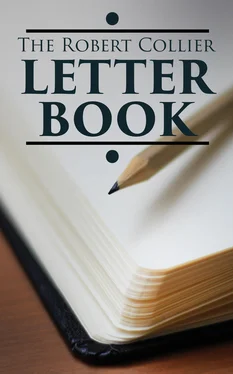Only the new letter-writer selects the arguments that are nearest to hand—the viewpoints that appeal to his own selfish interests. The experienced writer asks himself such questions as those above, then picks the motive that is strongest and presents it from the viewpoint of the reader alone. He shows what it will do for the reader, what it will add to his prestige, to his power, to his comfort, to the wellbeing of those he loves.
Description of your product is necessary. But description, no matter how interestingly done, will never sell your product by the thousands. It is what it will do for the one who buys it that counts!
There are six prime motives of human action: love, gain, duty, pride, self— indulgence and self—preservation. And frequently they are so mixed together that it is hard to tell which to work on more strongly. A man may want a new car, for instance, solely from a feeling of pride in its fine appearance, but unless money is a matter of no moment to him, pride alone will seldom make him buy.
To make that pride motive so strong as to sweep caution to the winds, you must reinforce it with a touch of self-indulgence, a measure of love and duty for wife and family, and a large dash of gain. Show how the old car hurts his standing, how repair bills and higher gas and oil consumption eat into the difference in price, how he can effect some saving now that will not be possible a month or a year later.
The more motives you can appeal to, of course, the more successful you will be, but it is important that you differentiate between the motive that makes him desire a thing and the one that impels him to take the action you desire, for the whole purpose of your letter is to make your reader act as you wish him to. He may not want to pay a bill, for instance. He may need the money badly for himself, and all his inclinations may be towards keeping it in his pocket. But if you can "sell" him the idea that his credit means more to him than the possession of that money or anything it can buy him, you have touched the right motive.
What has he to gain by doing as you wish? What to lose by refusing? "If someone were to make your boy a thief," read a National Cash Register Company letter. "Feeling as you do about your own boy, is it right to put temptation in the way of other men's boys?
Love and pride and duty are all intermingled there, with the added inducement of gain implied—of saving the losses from petty thefts and the like. But love is the dominant motive.
Love is always the strongest motive. You have but to read the papers to see how men are every day giving everything they have for it—riches and honor, life itself. Yet love is one of the most difficult motives to effectively work into a letter. Because it is so universal, it has been harped upon to such an extent that the letter writer has to be more adroit in its use than with any other motive.
Gain, now; that is easy. True, it has been worked to death, too, but we are a gullible race, and we are much readier to believe that someone is unselfishly interested in helping us to make or save money, than that he will go out of his way to further the well-being of those near and dear to us.
Tell a man, for instance, that you have only two cars left in stock, or ten suits in his size, or a hundred sets of books, and when the new stock comes in the price will be advanced 25 percent, but since he is an old customer you are holding one of these for him at the old price, and he will believe you. But try to tell the same man that your only reason for trying to sell the "Book of Knowledge" or the "Junior Classics" is your ardent love for and interest in the well-being of children, and he will laugh at you. He may buy these books if the good they will do his children is adroitly presented to him, but he resents having his love for them used as a leverage to dig money out of him for you.
Here is a skillful appeal to pride that was used with great success in the days before the automobile had crowded the horse and buggy off the road, and that can still be adapted to many another product just as successfully:
Mr. John Jones,
Jonesboro, N. C.
DEAR SIR:
Mr. Smith, our factory manager, just came in with your inquiry of Jan. 1st. He read it to me and said:
"You remember Mr. Jones, don’t you? He stands pretty high over there in Jonesboro where he lives—lots of folks know him. If Mr. Jones could drive one of our buggies around and tell his friends and neighbors who made it and how well satisfied he is with it, we could sell a lot more buggies in that neighborhood this coming year."
Then he suggested an idea which I know will please you immensely, Mr. Jones. Here it is:
I am having made to order for my own personal use just about the finest buggy that money can buy. Here’s a blueprint of it. See the extra strength I’ve built into the wheels. Note the triple ply springs that make riding easier. Mr. Smith just said: "Mr. Jones would surely be delighted with a buggy like yours. Why don’t you offer him this one? You can make another for yourself."
He thinks that if I send you my built-to-order buggy, you as a man who knows buggies, who knows what materials and finish ought to go into good buggies, will surely be pleased with it and certainly be envied by friends and acquaintances of yours who will see and admire my buggy when you drive it. I know Smith is right. So I’ve decided to act on his suggestion and let you have the buggy I’ve taken such great personal pride in designing.
Now, Mr. Jones, if an extra-fine buggy—one built specially to order for the President of the Columbus Buggy Co. would interest you—if such a buggy, with its longer wear and smarter appearance, would be worth a few dollars more to you—if you’d like to drive a buggy you’ll be proud of all your life, just fill out the attached form, send it back by return mail, and I’ll ship you a buggy like mine at once, or if you say so, I’ll send you the buggy now being made for me, and make another one for myself.
* * * * *
Of course, clothes don’t make the man. But you know yourself how helpful they are in getting him a hearing.
It is likely that Tom Edison or Charlie Schwab could wear any kind of clothes and not suffer particular loss of prestige if the suit happened to be shabby or a misfit.
But most of us have to be a bit mom careful. Aside from what our friends might think of us, we don’t feel right ourselves unless we have the consciousness of being well-groomed.
* * * * *
Through a fortunate purchase of fine wool, we are able to offer this MacCarden Motor Robe at a special low price of $9.85—about $5 or $6 less than you would expect to pay for a good robe in a retail store. We have been notified, however, that future wool will cost us much more; and we cannot hope to continue the $9.85 price when our present supply is gone.
Just glance over the enclosed folder and think for one moment of the absorbing, fascinating story that goes with it—education in the highest sense, entertainment in the most educational sense. People who have read this new, finally revised edition of the Outline are saying that it has done more for them than a College education. A College education costs you probably $5,000 and four years of your life. Wells’ wonderful work is sent to you on approval, and you will read the four books as absorbedly, as quickly as so many novels.
* * * * *
One of the oldest firms in the rubber business—a factory which makes tires that are as good as any in the world—wants to see if car owners will buy their tires ’direct’ if he will sell to them at just about the price dealers now pay.
This tire manufacturer knows that such a saving can be made if a lot of unnecessary selling expense and middlemen’s profits are wiped out. So he’s going to test out the motoring public by offering the very best tires he makes direct to car owners through our selling organization which operates by mail all over the country.
Читать дальше











